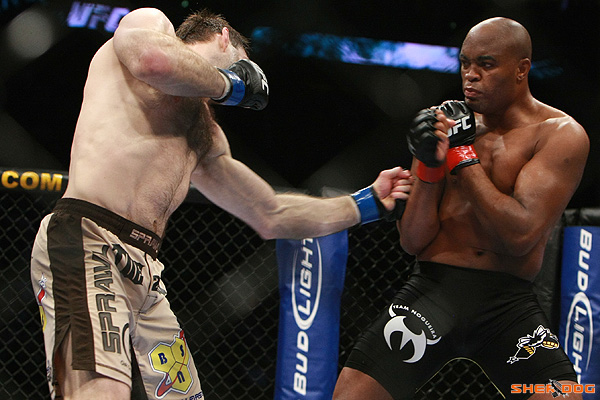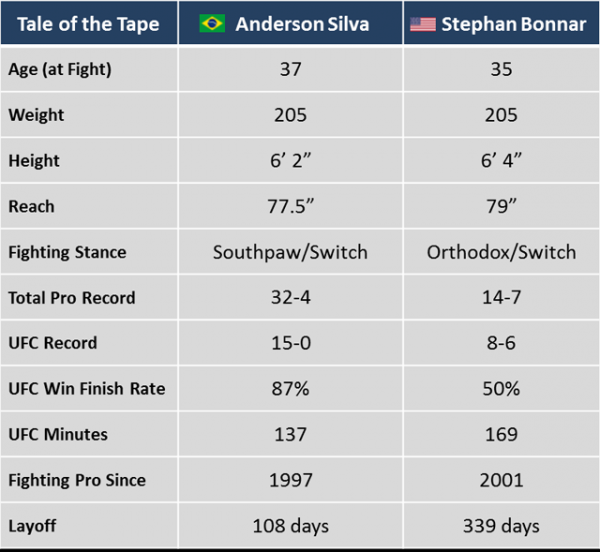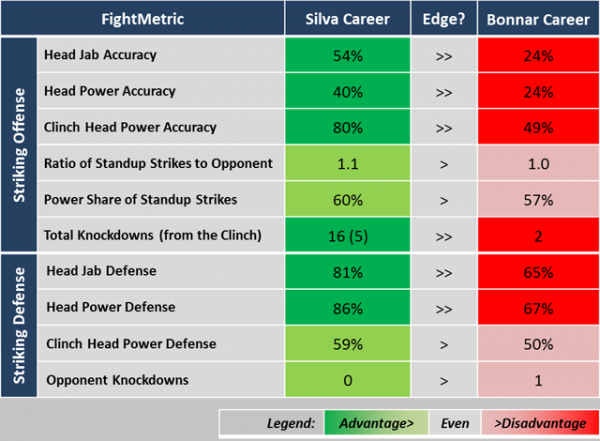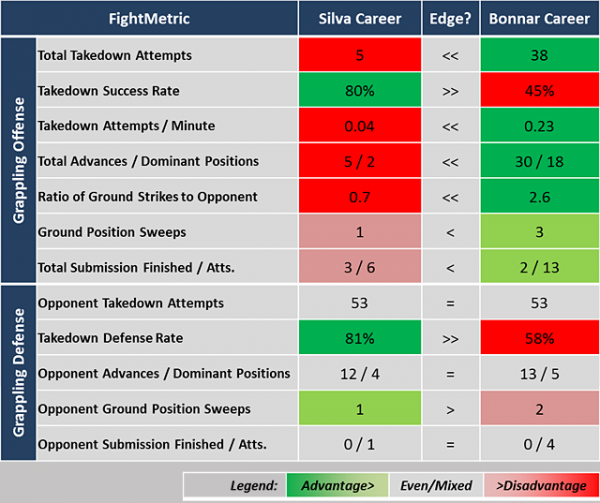UFC 153 ‘Silva vs. Bonnar’ Statistical Matchup Analysis
Reed Kuhn Oct 9, 2012

UFC 153 “Silva vs. Bonnar” on Saturday at the HSBC Arena in Rio de Janeiro, Brazil, gives our second straight pay-per-view headliner with an extremely lopsided betting line. However, the gasps heard during Vitor Belfort’s armbar attempt on Jon Jones at UFC 152 reminded us never to count out an underdog and that even perceived mismatches can still lead to exciting performances. The Ultimate Fighting Championship’s marketing team has even acknowledged this reality in some of the promos -- we could see a skilled and thorough finish or we could see a truly historic upset. They are promising a “fun fight.” The greatest fighter on the planet, Anderson Silva, is competing, and Stephan Bonnar is back in the Octagon; those are two great reasons to tune in.
So I went ahead and analyzed almost 15,000 data points and boiled them down to what you see here. The results show exactly how and why “The Spider” has such a big advantage over his opponent and also the clearest path for the historic upset the UFC reminds us is still a possibility.
Advertisement
Tale of the Tape

Silva, among his other exemplary characteristics, is a tall and rangy southpaw. Anthropometrically, that gives him a big advantage in most matchups, unless he one day steps up and fights Jones. However, at UFC 153, a couple things that benefit the underdog stand out in the tale of the tape.
First, Silva is facing his largest opponent yet in the UFC. At
6-foot-4 and with a 79-inch reach, Bonnar will have a larger,
heavier frame, and will for the first time ever put Silva at a
range disadvantage. We will get to striking stats in a moment, but
it is important to observe the potential for Bonnar to stay further
away from Silva’s most dangerous weapons than others have done
before.
Second, the long layoff means that for the first time in a long time the battered body of “The American Psycho” might actually be healthy. Bonnar has been in the UFC slightly longer than Silva, with almost as much activity. However, Bonnar’s legendary style of brawling has made for a violent career, and the damage done has taken a toll. Given Bonnar’s flirtations with retirement, this fight may represent his best chance yet to enter at 100 percent and leave it all in the cage. Fighting a legend on hostile ground as a massive underdog means Bonnar has little to lose by going for broke, and that usually means excitement.
Interestingly, both fighters tend to switch stances, making for an uncertain opening standoff. Watch for which stance each fighter comes out in, and look to see if either switches if his first salvo is not on target. Choice of stance could also affect Bonnar’s takedown strategy, should he decide to shoot early.
Now, let us move on to the performance statistics.
The Striking Matchup

The numbers show a glaring advantage for Silva on the feet, but that is nothing new for “The Spider.” His striking stats are as good as they get in the UFC. While Silva sometimes faces higher-paced fighters, that will not be the case here. His stats show an advantage all the way down the line.
The biggest difference is accuracy. Silva is a sniper, the most accurate fighter in UFC history, and while Bonnar’s striking is about average for the UFC’s 205ers, his defense has been sloppy. Perhaps that has been an ingredient to Bonnar’s reputation for brawling and having a good chin. However, that does not bode well against a striker like Silva, who has made other high-caliber fighters look amateurish by comparison.
Not only is this a clear mismatch on paper, but we have already previewed what Silva can do to larger, slower brawlers. For the third time now, Silva is competing at light heavyweight. Moving up in weight often means a tradeoff between power and speed, but in his two prior forays to 205 pounds, Silva maintained his highly accurate striking with great efficacy; and a total of four minutes and 24 seconds was long enough for Silva to knock out both his naturally larger opponents. That means he remains a real threat to Bonnar’s never-been-finished-outside-of-a-cut record, regardless of size or reach. Bonnar’s boxing was historically well-matched with Griffin’s, which is one reason for their epic rounds of back-and-forth brawling. Yet against Silva, Griffin looked to be moving in slow motion. Silva’s evasiveness and precision striking was the most perfect counter to Griffin’s slow, forward attack. Was it the Xanax, or is Silva simply that much better than other strikers? It is more likely the latter.
However, it is important to note that Silva’s chin was not really tested in those two fights at 205, as his defense was too good and the fights were over too fast. Any man standing across the cage from Silva has the potential to get knocked out, and Bonnar is no different. With that said, at 37 years old, Silva is not impervious to a well-placed right cross, especially one from a long-armed slugger who has shown such resilience in his fighting career. Chael Sonnen nearly dropped Silva in the opening seconds of their first fight, and Bonnar is much bigger than Sonnen. The question: can Bonnar withstand a few shots from “The Spider” and survive long enough to land a damaging shot of his own?
Silva will take this fight seriously, and he knows he should not take any unnecessary risks, like giving a free punch to “The American Psycho.” Silva has all the tools to dominate this fight on the feet, and his speed and accuracy will be the most obvious differences. Bonnar also knows this, and if he gets picked apart in the first exchanges, he will want this fight on the ground early.
Takedowns and the Grappling Matchup

Silva’s two fights with Sonnen have revealed what some believe is his only weakness. When put on his back by a strong wrestler working ground-and-pound, Silva lost a total of five rounds on the cards. Here is where the first statistical advantages show up for underdog. Bonnar has used ground control to win fights, and he backs up his ground game with a Carlson Gracie-flavored black belt in Brazilian jiu-jitsu. Silva brings a BJJ black belt of his own into the Octagon, but it has not been a huge part of his game and he generally prefers to keep fights standing, even if it means refusing top control.
The offensive takedown history favors Bonnar, who averages a high rate of takedown attempts with average success. While Silva’s takedown defense is far better than average, it is not perfect, and he has been put on his back. Wisely, Bonnar tends to attempt most takedowns from the clinch, which generally has a much higher success rate than shooting takedowns. If he finds the striking matchup to be too dangerous, Bonnar’s fallback plan will be to push forward to clinch and set up the takedown. From there, he has out-struck opponents almost three to one, while Silva has himself been on the receiving end of ground-and-pound more often than not.
From guard, Bonnar is quite active in passing and advancing to dominant positions, most commonly side mount. He has done this against light heavyweights historically, so, again, the natural size disadvantage for Silva may come into play if Bonnar can secure top position.
Between the two BJJ black belts, neither fighter has been submitted in the UFC, though Silva was submitted twice in Pride Fighting Championships. It is unlikely that either fighter will fall prey to a submission, unless it is first set up by strikes.
The roadmap to beat Silva on the ground made famous by Sonnen is surely top of mind for both fighters. By the numbers at least, a stifling ground-and-pound attack from the top appears to be Bonnar’s best chance for a historic upset. What’s more, Bonnar only has to fight three rounds instead of five -- a small concession from Zuffa for stepping up on hostile ground -- so questions about his stamina are less of a risk than if they had agreed to a five-round main event.
The Final Word
Historically, Bonnar has been a launch pad for the UFC light heavyweight division. He fought Griffin, Rashad Evans, and Jones, all of whom went on to win the UFC belt. He also faced Lyoto Machida early in his career. Unfortunately for him, the only common denominator here is that Bonnar lost all of these fights to championship-caliber opponents. On the upside, the fact that Bonnar has never been finished outside of a cut, even at this level, speaks well to his toughness and resilience. His only stoppage losses came from cuts -- one of them on an inadvertent head butt, resulting in a defeat he later avenged. No one doubts Bonnar’s willingness to stand, trade and survive, even if it means looking like a horror movie victim.
The question: what are the limits to this toughness? Only two UFC fighters have ever gone the distance with Silva in the UFC -- Demian Maia and Thales Leites -- both of whom avoided engaging him on the feet. Though Sonnen was finished twice, he unquestionably won each round he was able to complete. Despite the glaring statistical mismatch in striking, there appears to be a glimmer of hope for Bonnar to grind out rounds on the ground, doing his best Sonnen imitation, with the benefit of an extra 20 pounds and his BJJ experience as a buffer. Of course, grinding out two rounds without getting finished is easier said than done.
As a -1400 favorite, the market is giving Silva a 93 percent chance of winning. The only other time in UFC history that a betting line went that far was when favorite Mirko “Cro Cop” Filipovic debuted in the UFC and chased Eddie Sanchez around the Octagon before finishing him with strikes before the end of the first round. No other fight has seen a betting line beyond -1400. Even the UFC is acknowledging the huge perceived mismatch here, and some might consider this fight a gift from matchmaker Joe Silva to the fans of Rio de Janeiro.
Still, these two guys have to get in the cage and fight, and in mixed martial arts anything can happen, especially at this level. If the fight is as much of a mismatch as fans are expecting, the numbers show this will be one more addition to Silva’s highlight-reel and likely the end of another UFC career. In that case, at least we will get to see Bonnar, an ambassador of the sport, finally get to headline a major UFC event. The raucous Rio crowd may not be cheering him on the way in, but regardless of what happens in the fight, I think they will respect him on the way out.
Next month, we will examine what is considered a more competitive matchup between Georges St. Pierre and Carlos Condit, when the welterweight title gets unified at UFC 154 in Montreal. It will be interesting to see how those two stack up.
-- @Fightnomics
Note: Raw data for the analysis was provided by, and in partnership with FightMetric. All analysis was performed by Reed Kuhn. Reed Kuhn, Fightnomics, FightMetric and Sherdog.com assume no responsibility for bets placed on fights, financial or otherwise.
Like Fightnomics on Facebook, or follow on Twitter @Fightnomics to hear when new research and blog posts are available.
Related Articles







